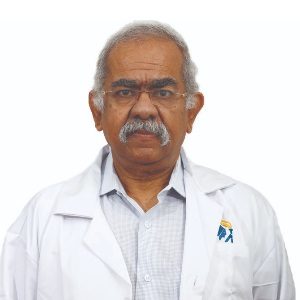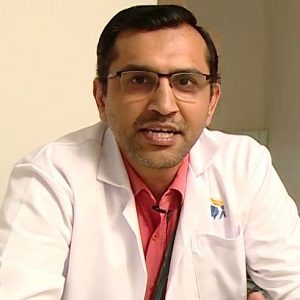Best Doctors in India for Liver Biopsy
- Surgical Gastroenterologist, Chennai, India
- Over 27 years’ experience
Profile Highlights:
- Dr. Surendran R is an experienced gastroenterologist from Chennai, Tamil Nadu.
- He has been rewarded for his contributions to the field several times. He received The Best Doctor award from the Tamil Nadu government (2002) in his name.
- Being a gastroenterologist, he specializes in treating patients with problems such as Bowel Obstruction, Pancreatic diseases, Esophagus disorders, Fistula treatment, etc.
- Gastroenterologist and GI Medicine Specialist, Chennai, India
- Over 23 years’ experience
Profile Highlights:
- Dr. Revathy Shanmugam is an experienced Gastroenterologist in Tamil Nadu, having an experience of 23 years in the management of GI disorders, Training & Teaching.
- She is highly skilled in the services like Liver Disease Treatment and Inflammatory Bowel Disease (IBD) Treatment.
- She has published various scholarly works in many National & International Publications of Medical Gastroenterology.
- Gastroenterologist and GI Medicine Specialist, Chennai, India
- Over 32 years’ experience
Profile Highlights:
- Dr. Hariharan Muthuswamy is a veteran Gastroenterologist and Hepatologist in India with 22 years of experience (specialist).
- Dr. Muthuswamy treated his patients with Non-Surgical Piles treatment, Liver Disease Treatment, Hepatitis E, Hepatitis A Treatment and Hepatitis B Treatment, Hemorrhoids Treatment, Colonoscopy, Stomach, and Intestinal Treatments, etc.
- He has a special interest in Capsule Endoscopy, Therapeutic Endoscopy, GERD, and Irritable Bowel Syndrome (IBS).
- Gastroenterologist and GI Medicine Specialist, Chennai, India
- Over 32 years’ experience
Profile Highlights:
- Dr. Mohan A T is a veteran GI medicine specialist in India with an experience of 32 years.
- Dr. Mohan, an alumnus of Madras University, is the Co-Ordinator of the Indian Society of Enteral and Parenteral Nutrition.
- He is an expert in treating Gastritis, acidity, Ulcerative Colitis, and many other Intestinal and bowel-related Treatments. In addition to these, he offers Colonoscopy, Gastroscopy, and Endoscopy.
- Gastroenterologist and GI Medicine Specialist, Chennai, India
- Over 15 years’ experience
Profile Highlights:
- Dr. Piramanayagam P is one of the young Gastroenterologists in India, having an experience of 15 years in the field.
- The doctor offer services like Gall Bladder (Biliary) Stone treatment, IBS treatment, Acidity Treatment, Endoscopy, and stomach and intestine dysfunction.
- He published many review articles and books under his name.
- Gastroenterologist and GI Medicine Specialist, Chennai, India
- Over 39 years’ experience
Profile Highlights:
- Dr. Sarojini Parameswaran is one of the renowned Gastroenterologist with an overall experience of 39 years.
- Dr. Parameswaran is brilliant and quick with diagnosis. She has 22 years of specialist experience.
- Gastroenterologist and GI Medicine Specialist, Chennai, India
- Over 24 years’ experience
Profile Highlights:
- Dr. Seshadri Venkatesh P is a well-known Gastroenterologist in India, having 24 years of experience in Stomach and Intestine disorders.
- Dr. Seshadri acquired proficiency in managing Bladder Cancer surgery, hemorrhoids, Irritable Bowel Syndrome (IBS) Treatment, etc.
- He holds membership in Tamil Nadu Medical Council.
- Gastroenterologist and GI Medicine Specialist, Chennai, India
- Over 40 years’ experience
Profile Highlights:
- Dr. Usha Srinivas is a Gastroenterologist in India with an experience of 40+ years in GI in medicine and academics.
- Patients visit her for consultation and treatment of abdominal pain, Gall Bladder (Biliary) Stone, Gastroenteritis, Jaundice, Colonoscopy, Steatosis, Constipation Treatment, Hepatitis C Treatment, Hepatitis E Treatment, Hemorrhoids Treatment, Piles Treatment (Non-Surgical), Gastritis Treatment, Ulcerative Colitis Treatment, and others.
- Gastroenterologist and GI Medicine Specialist, Chennai, India
- Over 18 years’ experience
Profile Highlights:
- Dr. Preethi M is one of the best gastroenterologists in India, with 18 years of expertise.
- Dr. Preethi received many awards for her contribution to the field.
- She offers consultation for Irritable Bowel Syndrome (IBS), Hemorrhoids, Endoscopy, female problems, and other gastrointestinal issues.
- Gastroenterologist and GI Medicine Specialist, Chennai, India
- Over 23 years’ experience
Profile Highlights:
- Dr. Ubal Dhus is a GI specialist doctor in South India who is proficiently managing Gastroenterological disorders for the past 23 years.
- He acquired his medical degree from Madras University, Chennai, and served people with Hemorrhoids Treatment, and Irritable Bowel Syndrome (IBS) Treatment.
Best Hospitals in India for Liver Biopsy
Venkateshwar Hospital, Dwarka, New Delhi
- City: New Delhi, India
Hospital Highlights:
- State-of-the-art technology and devoted healthcare professionals have been brought together under one roof at Venkateshwar Hospital to provide genuine medical care. The hospital’s professionals work together as a team to deliver the best possible treatment to their patients, using the most sophisticated equipment and information technology.
- Venkateshwar Hospital’s mission is to attain global excellence in healthcare by employing evidence-based, ethical clinical practices and cutting-edge technology by a team of highly skilled experts.
LIVER BIOPSY
Liver biopsy is a medical procedure in which a small amount of liver tissue is removed surgically, to analyze it in the laboratory for signs of damage or disease. A liver biopsy is recommended if blood tests or imaging tests suggest that you might be having a liver problem. This procedure can also help in determining the severity of your liver disease.
Purpose
A liver biopsy is usually done for one of the following reasons:
- To diagnose a liver problem which can’t be identified otherwise
- Obtaining a sample of tissue from an abnormality which was found in an imaging study
- Determining how severe the liver disease is
- Monitoring the liver after a transplant
- Helping develop efficient treatment plans based on the condition of the liver
- Determining how well the treatment for your liver disease is working
A liver biopsy may be recommended if you have:
- Abnormal liver test results without any explanation
- Ongoing, unexplained fevers
- A mass (tumor) or any other kind of abnormalities on your liver as seen on the imaging tests
A liver biopsy is also performed for diagnosis and staging certain liver diseases, including:
- Nonalcoholic fatty liver disease
- Autoimmune hepatitis
- Alcoholic liver disease
- Chronic hepatitis B or C
- Primary biliary cirrhosis
- Primary sclerosing cholangitis
- Wilson’s disease
- Hemochromatosis
Preparation
If you are pregnant or having a heart or lung condition, or are allergic to certain medications, you need to inform your doctor. If any blood tests are required, remember to get them done. It is important that you find out how long before the procedure you need to begin fasting. Arrange for a friend or family member as well, to ride you home after the procedure.
For the week before the procedure, you need to avoid aspirin or any products containing aspirin. Avoid all kinds of anti-inflammatory drugs as well such as ibuprofen and Advil, unless your doctor advises otherwise.
Procedure
A liver biopsy is usually done at the hospital or at an outpatient center. You need to arrive early in the morning. Your medical history will be reviewed by your healthcare team.
Before your biopsy, you will have an IV line placed into a vein in your arm, so that you can receive any kind of medications if or when needed. You might also be possibly be given a sedative in order to help you relax during the procedure.
Since you will need to remain in your bed for a few hours, use the toilet in advance if you need it.
There are different types of liver biopsy and the steps vary in each.
Percutaneous biopsy
Before beginning the procedure, your doctor will need to locate the liver by tapping on your abdomen or with the help of ultrasound images. Ultrasound might be used in certain situations during the biopsy so that the needle can be guided properly into your liver.
You will need to lay on your back and then position your right hand above your head on the table. A numbing medication will be applied to the area where the doctor will insert the needle. The doctor will next make a small incision near the bottom of your rib cage on the right side, after which he/she will be inserting the biopsy needle. The biopsy itself takes only a few seconds. You will need to hold your breath, as the needle passes in out and out of your liver.
Transjugular biopsy
You’ll need to lay on your back on an X-ray table. Your doctor will apply a numbing medication to one side of your neck, after which he/she will be making a small incision and then insert a flexible plastic tube into your jugular vein. The tube will be threaded down the jugular vein and then into the large vein in your liver (hepatic vein).
After this, your doctor will inject a contrast dye into the tube after which he/she will be making a series of X-ray images. The dye will show up on the images and allow your doctor to see the hepatic vein. Then a biopsy needle is threaded through the tube, after which one or more liver samples are removed. The catheter is removed carefully removed. The incision on your neck is wrapped with a bandage.
Laparoscopic biopsy
During a laparoscopic biopsy, you will most likely need general anesthetics. You will be positioned on your back on the operating table, and a small incision will be made by your doctor in your abdomen. Special tools will then be inserted through the incisions, which will include a tiny video camera for projecting images on a monitor in the operating room. The doctor will use the video images to guide the tools to your liver in order to remove samples of your tissue. After this, the tools will be removed and the incisions are closed with stitches.
After the Procedure
You will need to stay in a recovery room for up to 4 hours so that you can be observed. You might also experience slight pain or soreness at the biopsy site and dull pain in your shoulders or back. Pain medication can be prescribed if necessary.
Remember not to drive or operate machinery for at least eight hours after your procedure. Avoid taking aspirin or any products containing aspirin, or any kind of inflammatory drugs for at least one week after the procedure.
Avoid any kind of vigorous physical activity or heavy lifting for at least 24 hours for up to a week after the procedure. After some days, your doctor will be discussing the biopsy results with you.
Risks
Though a liver biopsy is a safe procedure when performed by an experienced doctor, there are few possible risks which can include:
- Pain- Pain at the biopsy site is known to be the most common complication after the procedure. However, it is just mild discomfort. If the pain makes you too uncomfortable, you might receive narcotic pain medication.
- Bleeding- Bleeding might also sometimes occur after a liver biopsy. If there is excessive bleeding, you might need to be hospitalized for a blood transfusion or surgery to stop the bleeding.
- Infection- In rare cases, bacteria might enter the abdominal cavity or bloodstream.
- Accidental injury to a nearby organ- In rare cases, the needle can also stick to another internal organ, such as the gallbladder or a lung, during the procedure.













